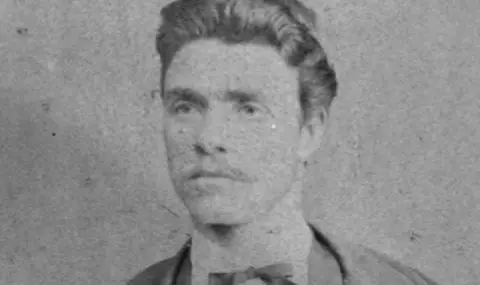On December 11, 1868. Vasil Levski is going on his first organizational tour around Bulgaria.
The Deacon leaves for Constantinople by steamer from Turnu Magurele. From there, he began his first tour in the interior of the country, supported by the “Bulgarian Society”. Levski visited Plovdiv, Perushtitsa, Karlovo, Sopot, Kazanlak, Sliven, Tarnovo, Lovech, Pleven and Nikopol. He contacts trusted acquaintances and studies public sentiment and the people's readiness for rebellion. He is encouraged by the initial results achieved and on February 24 he returns to Bucharest.
On May 1, 1869 Apostola embarks on his second tour. This time it is supplied with information about internal actors, with a power of attorney and a proclamation issued on behalf of the Provisional Government in the Balkans. Naturally, such does not exist, but Levski rightly considers that it will be easier to win people's hearts if he presents himself on behalf of an authoritative organization. Makes contacts in Romania – such as the one with Danail Popov, who initially recommended him to his brother in Pleven, and later served the Apostle as a liaison with the emigrant circles in Wallachia. Popov's brother introduced Levski to people loyal to the liberation struggle in cities close to Pleven, and thus began the construction of the committee network – first in Pleven, and then in Lovech, Troyan, Karlovo, Kalofer, Kazanlak, Plovdiv, Sopot, Chirpan and other settlements. During the second tour, the Apostle reconsidered his assessment of the readiness of the people for an imminent uprising and concluded that much more thorough preparation was needed.
On August 26, 1869 Levski returns to Bucharest. He has a clear idea of the situation in Bulgaria and the possibility of success of the committee network, therefore he must convince the emigrant revolutionary intelligentsia of the rightness of his ideas. At first he met complete misunderstanding among the revolutionaries, who still harbored hopes that help would come from elsewhere. At the end of 1869 Apostola, together with Lyuben Karavelov, participated in the founding of the Bulgarian Revolutionary Central Committee (BRCC). Although Karavelov adopted some of Levski's ideas, the two leaders of the revolutionary movement differed in their basic views. For Karavelov, the participation of the neighboring Balkan nations in the future revolution is absolutely mandatory, while Levski believes that this would help the rebellion, but the main role should be played by the Bulgarian population.
Levski left to the generations about 140-150 letters and proclamations, in which he set out his ideas about the equality of people, about human rights and freedoms, the idea of democratic government, of communication between peoples and perfect equality between them, the idea of legality and equality before the law.
